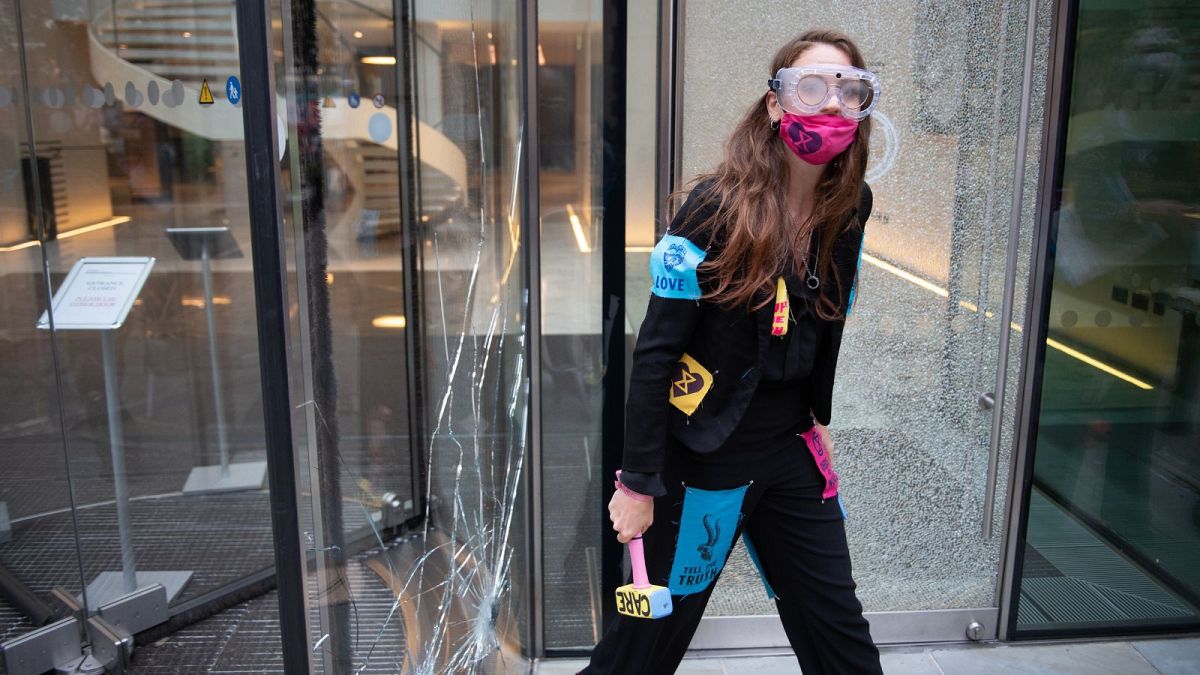Five Extinction Rebellion protesters could be the last to use the defence, after the government asked the Court of Appeal to review it.
UK climate protesters charged with criminal damage could have their last legal defence removed if the government gets its way in a significant court case this week.
Attorney general Victoria Prentis KC, who represents the government, has asked the Court of Appeal to review whether activists can continue using a defence known as ‘belief in consent’.
Some campaigners on trial have successfully argued that a property owner wouldn’t mind the damage caused to their building in a nonviolent action, if they were aware of the full extent of the climate crisis.
Five women charged with criminal damage after breaking windows at the office of banking giant JPMorgan, for example, are using the defence in their trial which began on Monday.
But the Extinction Rebellion activists could be the last to do so, if the Court of Appeal – the UK’s second highest court – rules in the attorney general’s favour in a hearing which starts today.
What is the UK’s ‘belief in consent’ rule?
The UK’s Criminal Damage Act 1971 gives a defence of lawful excuse to a person who “believed” that the property owner would have consented to the damage if they had “known of its circumstances.”
For example, if you saw a dog overheating in a car and broke the window to save it, you could reasonably say you believed the car owner would have consented to you doing so if they were aware of the threat to life.
Climate activists on trial for criminal damage after spraying or smashing windows at fossil fuel company offices have been relying on this defence – with mixed success.
A string of acquittals last year prompted the attorney general to ask for clarity on this subsection of the act.
“I have made this reference as it is important that the law is clear and fairly applied,” Prentis wrote in December. “I look forward to the Court of Appeal considering this issue.”
But campaigners have also complained of a judicial “lottery”, as some have been convicted for the same acts, and barred by judges from telling juries the motivation for their actions.
Extinction Rebellion (XR) co-founder Dr Gail Bradbrook was denied the use of the defence during her trial in November for breaking a window at the Department for Transport in 2019.
‘Emergency break glass’: The case of the five on trial for smashing JPMorgan’s windows
On 1 September 2021, eight XR activists attached stickers to JPMorgan’s European headquarters in London Blackfriars, reading ‘in case of climate emergency, break glass’. They then smashed the windows.
Five women who took part in the action appeared before Judge Reid at Inner London Crown Court on 19 February, in a trial expected to last seven days. They range in age from 29-year-old Stephane Aylett, a former medical device representative from St Albans, to 67-year-old Rosemary (Annie) Webster, a retired cook and beekeeper from Dorchester.
JPMorgan has been the biggest single financier of fossil fuels since the Paris Agreement came into effect, according to a report from Rainforest Action Network. It poured $434 billion (over €400 billion) into the sector between 2016 to 2022.
The five activists have been summoned to answer charges of criminal damage to the value of £330,000 (€385,000).
With the legal defence of ‘belief in consent’, they are arguing that the bank would have consented to the damage, if only it comprehended the damage its fossil fuel funding was causing.
Though it’s unlikely to see JPMorgan admitting in court it is aware of the destruction fossil fuel emissions are causing, observers are interested to see how the bank responds to the defence.
What is the government’s argument against climate activists?
Documents seen by UK newspaper The Times give the outline of the government’s argument in seeking the review.
Representing the attorney general, Tom Little KC writes that “the merits, urgency or importance of any matter about which a defendant may be protesting or the perceived need to draw attention to a cause or situation are not, in law, capable of being ‘circumstances’ of the destruction or damage within the meaning of the statute”.
Little argues that there is “no direct nexus between the destruction or damage and the matters on which the defence rely as ‘circumstances’”.
In other words, it’s unclear how breaking the windows of a fossil fuel company or bank relates to or will stop climate breakdown elsewhere. The appeal court judges are effectively being asked to consider where and why climate activism turns to vandalism.
The review follows an acquittal in an unidentified case but, as Prentice made clear, the outcome will not affect the acquittals in that particular case. It will remove the ability of protesters to run the defence in the future. Which means that the JPMorgan ‘Emergency Break Glass’ five could be the last to benefit from it.
UN rapporteur ‘alarmed’ by UK government crackdown on protests
This is the sixth jury trial of women from XR who have broken glass at major banks and fossil fuel headquarters, the group says. Of the 20 women who have stood trial so far, 10 have been found guilty and 10 have been acquitted.
One of the women in front of Judge Reid this week, Amy Pritchard, was sentenced to prison last year for breaching his ruling not to mention ‘climate change’ as a motivation to jurors trying her for blocking a road during a separate action with Insulate Britain.
Such decisions from judges have caused outrage among environmental campaigners in the UK and abroad.
In a report last month, UN Special Rapporteur on Environmental Defenders Michel Frost expressed “alarm” at the situation after visiting the UK.
“It is very difficult to understand what could justify denying the jury the opportunity to hear the reason for the defendant’s action, and how a jury could reach a properly informed decision without hearing it, in particular at the time of environmental defenders’ peaceful but ever more urgent calls for the government to take pressing action for the climate,” he wrote.
Two other UK climate protest trials also began this week. Eight Insulate Britain activists are charged with public nuisance for stopping traffic on the M25 motorway in 2021. While five Just Stop Oil supporters must answer for conspiracy to cause a public nuisance after occupying tunnels near an oil terminal in 2022.












